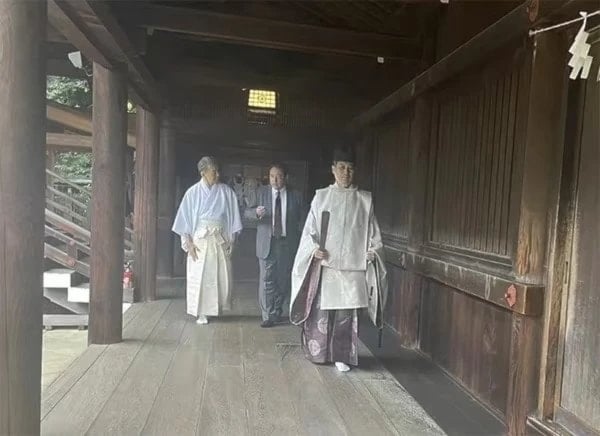Chinese netizens outraged by Ukrainian envoy visit to Yasukuni shrine
Many Chinese users expressed outrage, calling the visit insulting and disrespectful to China.
-

This image of the Ukrainian ambassador to Japan visiting the Yasukuni Shrine on September 3, 2024, sparked nationwide outrage in China (@windgo13)
The South China Morning Post reported on Friday that the Ukrainian Ambassador to Japan, Sergiy Korsunsky, has faced widespread criticism from Chinese internet users for his visit to the Yasukuni Shrine in Tokyo, a site associated with Japanese militarism in Asia.
Many Chinese users expressed outrage, calling the visit insulting and disrespectful to China.
The Ukrainian Embassy in Japan has since deleted a post about Korsunsky's visit, but photos shared by other users from the original post show that the ambassador visited the shrine on September 3, coinciding with the 79th anniversary of the end of the Chinese People's War of Resistance Against Japanese Aggression and the World Anti-Fascist War.
Korsunsky also left a message in the shrine's memorial book during his visit.
乌克兰驻日本大使选择我们的“胜利日”去参拜靖国神社,会让中立民众对乌克兰政府的行径感到厌恶和反感。 pic.twitter.com/aUNBNZlTk7
— Owen(互fo) (@Owen05080215) September 6, 2024
The criticism quickly spread across Chinese social media, with the hashtag "The Ukrainian Ambassador in Japan worshiped ghosts" gaining popularity.
A comment from Nyutanjing, a WeChat account linked to the Xinhua news agency, described the visit as "disrespectful" to China, while others accused Korsunsky of "rubbing salt into the wound" by visiting on such a significant date.
Read more: South Korea slams Tokyo's visit to notoriously imperialist shrine
The Yasukuni Shrine commemorates 2.5 million Japanese soldiers who died in wars, including 14 convicted Class A war criminals from World War II.
Japanese politicians traditionally visit the shrine during festivals in April, October, and on August 15, the anniversary of Japan's surrender in WWII, a practice that regularly draws protests from Beijing.
乌克兰驻日大使去拜二战甲级战犯,联合国不敢评价。乌克兰大使如果去拜纳粹,联合国还能安稳吗?
— K.L (@kinglinzhuhui) September 6, 2024
pic.twitter.com/iCAHXcDCDS
The Chinese Foreign Ministry has repeatedly condemned the Yasukuni Shrine as a symbol of Japanese militarism and aggression, protesting each time Japanese politicians visit, stating that such actions reflect a refusal to properly address historical issues.

 2 Min Read
2 Min Read








